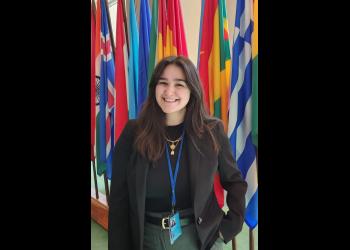View from the Interns: Reflections on the 62nd Commission for Social Development
By Hannah Escandon
The first time I ever truly connected with a stranger was while riding in the backseat of my parents’ car at the age of 12, as we crossed over the border of Bahrain back into Saudi Arabia. Only a few months into what became my three-year-long expat life, I deeply missed my American culture and home. The radio was on as we sat in traffic, playing a podcast my dad had queued up, we all listened as he turned up the volume and said “this is a good one.” As the voice from the podcast filled the car, the storyteller began sharing their own misadventures of life that somehow mirrored my own feelings of displacement. It was a moment of realization that human emotions and experiences are universal, easily connecting us with those around the world.
No matter where we are, stories have the power to unite us, making the world feel a little bit smaller and a lot more connected. In an era dominated by rapid information exchange, the need for connection, inclusivity, and diversity through storytelling has never been more critical to reviving the public’s trust of the United Nations and international institutions.
During the 62nd Commission for Social Development key focus was placed on rebuilding trust in the United Nations alongside the progression towards equality, poverty eradication, and digital transformation. Danilo Türk, Former President of Slovenia and President of Club de Madrid, even highlighted this during a side event at the BIC. During closing remarks he said, “The United Nations could have a much better image if it was better able to tell stories,” emphasizing the power of storytelling in improving public perception.
Since the mid-1990s confidence in international institutions has steadily declined, only exacerbated by the impacts of conflict, pandemics, and climate change. These crises serve as stark reminders of the vulnerabilities that define our globalized world and each crisis has tested the resilience and responsiveness of international entities.
The erosion of trust in international bodies is a reflection of perceived failures to adequately address the world's most pressing issues. Under the weight of skepticism the efficacy of international efforts aimed at poverty eradication, education, and equitable access to healthcare will be called into question.
Yet, there is a new window of opportunity on the horizon, the opportunity to reinvent and reimagine the narrative behind social development.
In a world fractured by crises, the restoration of trust is imperative. It is more than a factor of global solidarity, but the foundation to a sustainable future. Storytelling possesses a transformative power, furthering social development by humanizing complex issues and making global challenges more digestible.
International organizations can bridge the gap between policy discussions and the real-life impacts of their decisions by using empathy and fostering deeper connections between the public and the work of institutions. Discussions of statistics and graphs are turned into stories of shared humanity and collective action, the good and the bad of new ideas are now transparent, and people can be connected globally.
Storytelling is capable of rebuilding trust by extending more personal connections with international audiences. Sharing narratives can illuminate the human element behind the missions of international organizations and it serves as a reminder that behind every policy decision there are people striving to make a difference in the world.
Hannah Escandon is an intern at the Baha’i International Community United Nations Office
